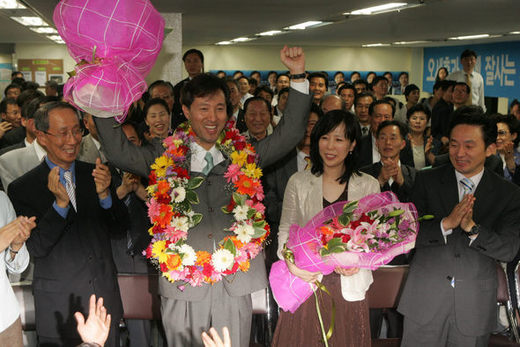 |
|
GNP mayorial candidate Oh Se-hoon celebrates his victory in the May 31 local elections. (Kim Jong-su)
|
S.K. economic condition among reasons cited for Uri Party defeat
South Korea’s main opposition party swept local elections Wednesday, in which over 38,000 government officials were chosen. The Grand National Party (GNP) won the majority of seats, according to the National Election Commission. The results come in stark contrast with a meager performance by the ruling Uri Party, which commanded a sweeping victory in the previous local elections. The GNP has secured an over 40-percent approval rating since late last year, unaffected by a sex scandal involving one of its members and allegations of influence peddling. Some experts say that such one-sided election results are attributable to a change in the political environment in South Korea, in which economic performance is valued more than ideological concerns."The current ruling Uri Party is considered the main culprit in the widening gap between the haves and have-nots," said Jo Yong-kyu of an independent polling firm. "GNP members such as Lee Myun-bak, mayor of Seoul, and Sohn Hak-kyu, governor of Gyeonggi province, are regarded as being behind [successful public works projects] and the attraction of huge business investment." Experts also attributed the GNP’s overwhelming victory to an emergence of a conservative group presence on the Internet, where progressive groups had previously dominated. "[Through expanded contact with netizens], the GNP succeeded in attracting moderate centrists," said Kim Ho-ki, a professor of Yonsei University. "The victory of the opposition party will result in expanded [online] activity by conservatives," he predicted. Overall, the crushing defeat suffered by the Uri Party, most experts agree, represented its failure to attract nationwide support for its reform initiatives. Also widely cited was the fact that Uri has no strong potential candidate in line for the upcoming presidential election.





